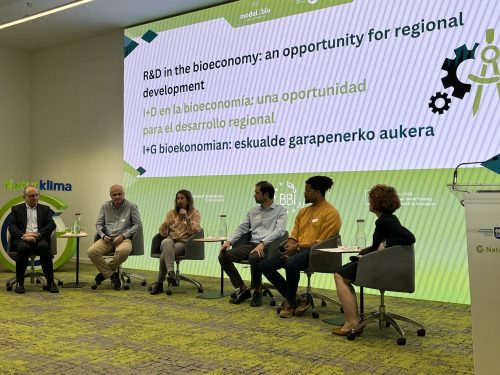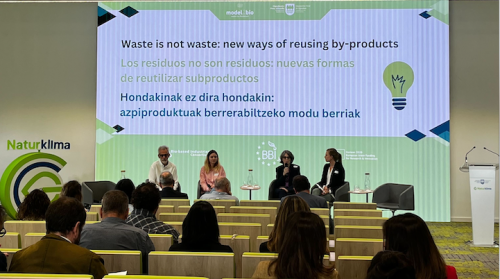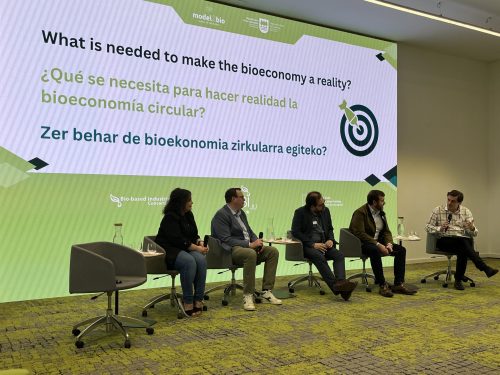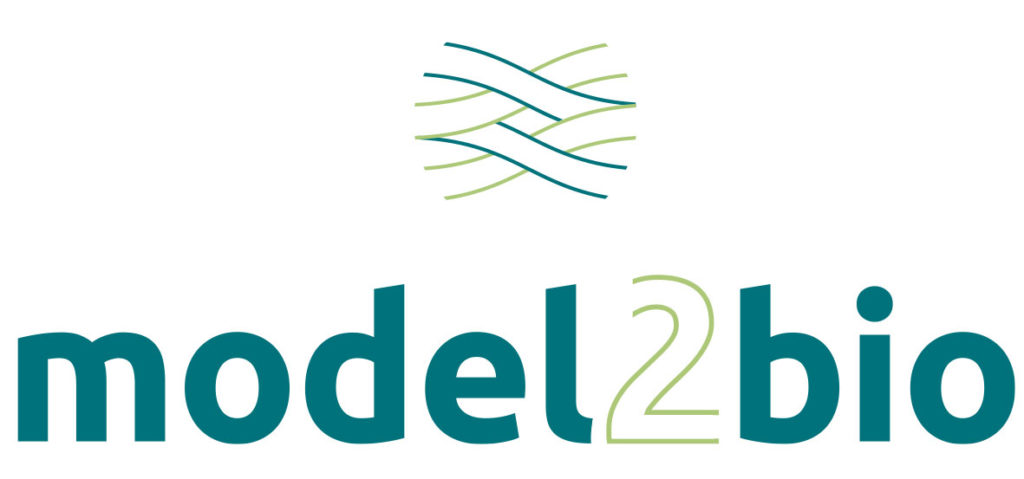On 19th October, scientists, food companies and policy makers gathered for a hybrid event to talk about the bioeconomy. The opportunities it brings, the challenges it poses to us and new ways for reusing agri-food beyond animal food.
After a warm welcoming address by the Deputy for Sustainability of the Provincial Council of Gipuzkoa, José Ignacio Asensio, and insightful keynote talk by Jesús Alqueza from the European Commission about European policy, the first session started:
R&D in the bioeconomy: an opportunity for regional development
Leading professionals from the agri-food sector and scientific institutions shared their insights into the latest research and developments in the field of bioeconomy, such as upcycling bread to produce mycoprotein or to produce microalgae-based products. Their experience in the field then fueld a stimulating panel discussed on the opportunities of the bioeconomy with main points being:
- The concept of “Bioeconomy“ is new, but methods to reuse by-products and work to develop such methods has been around for years when this theoretical framework was not yet coined. Understanding the theoretical framework is important, but collaboration is important to put it into practice.
- Valorisation of by-products can reduce waste and our environmental footprint. It can increase revenue and the image of a company, and open up new markets and business opportunities.
- For a successful bioeconomy technical feasibility and sustainability of the production have to be considered. For successful scale up and industrial production, collaboration with engineering companies and guaranteeing the supply of the needed biomass are important.
- A big obstacle to the marketing of products recovered from agri-food residues is whether they are approved for their intended use (e.g. microalgae and their compounds in food), the regulatory issue of how to label these products, and the consumer acceptance.

Jon Zubiria from Ondoan, Iñaki Garcia from ORLOGA, Goizane Lizarralde from OKIN, Enrique Aymerich from Ceit, Anaut Patterson from Algaloop, Garbiñe Manterola from BRTA
Lucia Fernández from CBE JU gave a short opening talk about the importance of a competitive bio-economy for a sustainable future, before the Model2Bio team presented highlights of their research work:
Waste is not waste: new ways of resuing by-products
New value chains identified within the Model2Bio project were presented, such as for cheese whey and brewer’s spent grain. Project partners explained aspects important for establishing new value chains, but also showed newly developed processes to produce value-added compounds from cheese whey, brewer’s spent grain, potato peel and grape pomace using extraction and fermentation. These are part of the data, that the Model2Bio team feed into their decision-support system tool. Designed to identify the best options to reuse agri-food by-products, these kind of tools can help early on in business development to:
- Understand if the business is profitable
- Evaluate the problems with logistics
- Find out if enough residual stream available
- Identify a suitable location for the new business

Luis Sancho from Ceit, Camille Malterre from Celabor, Ana López Conreras from Wageningen University & Research and Melanie Maria Obermeier from ESCI.
What is needed to make the circular bio-economy a reality?
After a short presentation of FIAB, research projects and companies that already successfully valorise agri-food products, experts brought their experiences to a panel discussion and identified what is needed for establishing a bioeconomy:
- New businesses are needed.
- Funding; made available also to start-ups interested in implementing new technologies and processes.
- Companies have to be involved from the start to adapt research to the companies’ needs and build trust in order to obtain the data necessary for research.
- Governments and regulatory bodies should encourage companies to share data and need to adapt faster to new development, so innovation can be implemented.
- Good communication and collaboration between universities, companies, start-ups and governments.
- Improving the pilot infrastructure to bridge the gap between lab-scale and industrial scale.

Tamara Fernández from Ceit, Maarten Uyttebroek from Flanders’ FOOD, Miguel Ángel Cubero from Ingredalia, Eduardo Cotillas from FIAB and Javier Santos Garcia from Tecnun.
The conference was jointly organised by the Department of Sustainability of the Provincial Council of Gipuzkoa and the Model2Bio project.

